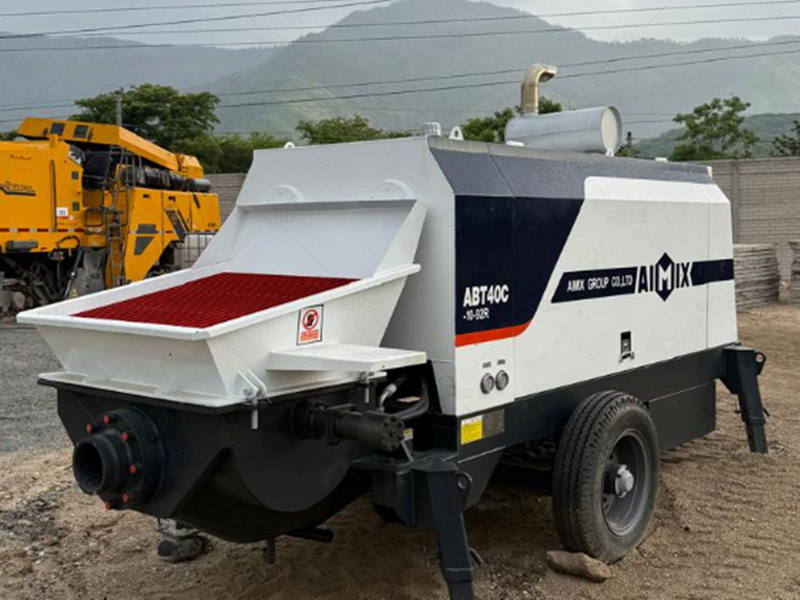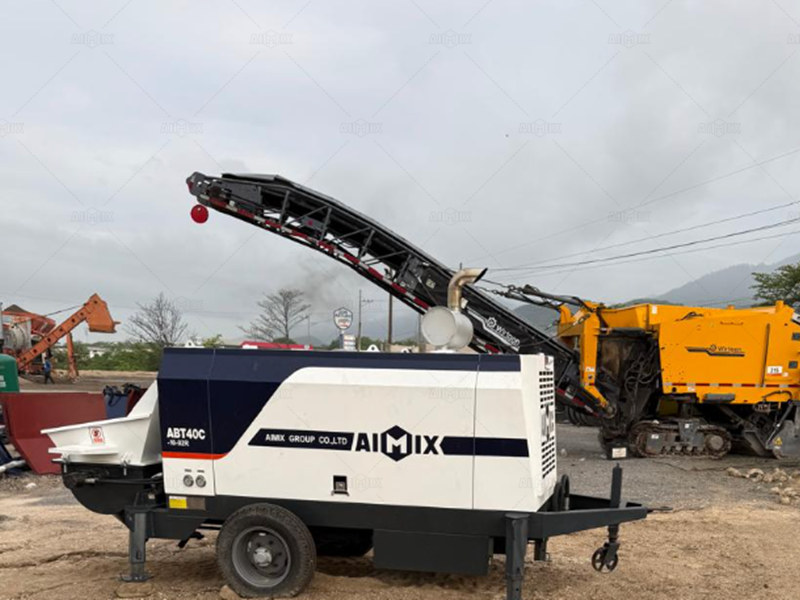The transportation of concrete trailer pumps for sale across South Africa’s diverse geographical landscape requires meticulous planning and strategic execution to balance safety requirements with economic efficiency while managing the overall cost of concrete pump operations. Whether relocating a small portable concrete pump between urban construction sites or moving larger units to remote project locations, the process demands careful consideration of route selection, equipment preparation, regulatory compliance, and transportation methodology. The fundamental challenge for contractors and equipment owners lies in developing a systematic approach that minimizes downtime, prevents equipment damage, and controls expenses while ensuring the safe arrival of these valuable assets at their destination. This comprehensive framework for equipment transportation addresses the unique conditions encountered when moving concrete pumps for sale in South Africa, from navigating the country’s varied infrastructure to complying with provincial regulations, all while implementing cost-control measures that preserve profitability. By adopting proven strategies for equipment mobilization, businesses can significantly reduce the indirect cost of concrete pump ownership associated with transportation while maintaining the highest standards of operational safety and equipment protection throughout the relocation process.

Comprehensive Pre-Transport Planning and Assessment
The foundation of successful equipment movement begins with thorough pre-transport planning, a phase that directly influences both safety outcomes and the ultimate cost of concrete pump relocation. This process should commence with a detailed assessment of the specific concrete trailer pumps for sale being transported, documenting critical dimensions including width, height, length, and weight, then comparing these specifications against South African road regulations to determine if standard transport is possible or if special permits will be required for oversized loads. Route planning represents another crucial element, requiring careful evaluation of the entire journey from origin to destination, with particular attention to potential obstacles such as low bridges, narrow passages, sharp turns, or weight-restricted bridges that might necessitate alternative routing. For businesses operating multiple concrete pumps for sale in South Africa, maintaining a database of previously successful routes and challenges can significantly streamline this planning process for future moves. Additionally, timing considerations should factor into the planning phase, as coordinating moves during off-peak traffic hours or on less congested days can reduce transit time and fuel consumption, thereby lowering the overall cost of concrete pump transportation while simultaneously enhancing safety through reduced exposure to dense traffic conditions. This comprehensive planning approach, while requiring initial time investment, ultimately delivers substantial returns through smoother operations, fewer unexpected delays, and controlled transportation expenses.
Equipment Preparation and Securement Protocols
Proper preparation of the concrete trailer pumps for sale before transit is essential for preventing damage during movement and ensuring road safety, with specific procedures varying based on the pump’s design characteristics and transportation method. The preparation process should begin with a thorough cleaning of the equipment to remove concrete residue and debris that could become dislodged during transit, creating hazards for other road users, followed by a mechanical inspection focusing on the trailer’s braking system, lighting connections, tire condition, and structural integrity. For a small portable concrete pump, this might involve folding boom sections (if equipped), retracting stabilizers, and securing all moving parts using appropriate locking pins or restraints to prevent unexpected movement during transit. The securement phase requires particular attention, with heavy-duty straps, chains, and binders of appropriate grade and capacity used to immobilize the equipment on the transport trailer, distributing tension points to avoid damaging sensitive components while ensuring the concrete trailer pumps for sale cannot shift, slide, or tilt during normal transportation forces. Additional protective measures might include installing temporary covers over vulnerable hydraulic connections, removing or properly securing accessories, and applying protective materials to polished surfaces or components prone to abrasion during transit. While these preparation steps require time and resources, they represent a valuable investment in preventing costly damage that would far exceed the modest cost of concrete pump protection measures, while simultaneously reducing the risk of accidents that could result in far greater financial and safety consequences.
Transportation Method Selection and Optimization
Choosing the appropriate transportation method for concrete trailer pumps for sale represents a critical decision point that significantly influences both safety outcomes and the total cost of concrete pump relocation within the South African context. For shorter distances and accessible sites, towing the small portable concrete pump behind a suitable heavy-duty vehicle often represents the most economical approach, provided the towing vehicle possesses adequate power, braking capacity, and the driver has experience with heavy equipment transport. For longer distances or when moving larger concrete pumps for sale in South Africa, professional transport services using low-bed trailers may prove more efficient and safer despite the higher direct cost, as these specialized carriers possess the equipment, expertise, and insurance coverage to handle heavy machinery transport safely and in compliance with regulations. The economic analysis should compare the visible and hidden expenses associated with each option, including fuel consumption, potential toll fees, driver time, wear on equipment, and risk exposure when determining the true cost of concrete pump transportation via different methods. For businesses frequently moving equipment between sites, developing relationships with reliable transport contractors can yield preferential pricing and priority service, ultimately reducing both the financial and time cost of concrete pump relocations while ensuring consistent safety standards through repeated engagements with familiar service providers who understand the specific requirements of transporting concrete pumping equipment.
Route-Specific Risk Mitigation and Safety Measures
The varied terrain and infrastructure conditions throughout South Africa necessitate route-specific risk assessment and mitigation strategies when transporting concrete trailer pumps for sale to ensure safety and prevent costly incidents. Before departure, drivers should conduct a final route verification, checking for recent changes in road conditions, temporary restrictions, or weather-related challenges that might necessitate adjustments to the planned pathway, with particular attention to seasonal factors like summer rainfall that can affect road stability in certain regions. When transporting a small portable concrete pump through urban areas, specific considerations include overhead clearance in residential neighborhoods with abundant tree cover, width restrictions in older suburban streets, and traffic management in busy commercial districts, all requiring advance planning to avoid delays or accidents. For journeys involving concrete pumps for sale in South Africa through rural or remote areas, different challenges emerge including unpaved road surfaces, narrow mountain passes, limited fuel availability, and reduced cellular coverage, necessitating additional preparations such as carrying extra fuel, emergency supplies, and satellite communication devices. Throughout the transport process, implementing consistent safety protocols including regular stops for equipment checks, maintaining appropriate speed for the load and road conditions, and using escort vehicles when required for oversized loads all contribute to incident-free transportation. While these safety measures require additional time and potentially increase the direct cost of concrete pump movement, they represent essential investments in preventing accidents that could result in equipment damage, personal injury, regulatory penalties, and project delays with financial impacts far exceeding the preventive expenses.

Regulatory Compliance and Documentation Management
Navigating South Africa’s regulatory framework for heavy equipment transportation is essential for legal compliance and avoiding costly penalties that would significantly increase the overall cost of concrete pump relocation while ensuring public safety. The specific requirements vary by province and municipality, but generally include permits for oversized loads, special route approvals, and potentially escort vehicle mandates depending on the dimensions and weight of the concrete trailer pumps for sale being transported. Understanding these regulations before movement begins is crucial, as violations can result in substantial fines, equipment impoundment, and project delays that dramatically increase the true cost of concrete pump transportation beyond the budgeted amount. Proper documentation must accompany each move, including equipment ownership papers, transport permits, insurance certificates, and when crossing provincial boundaries, any inter-provincial transport requirements specific to concrete pumps for sale in South Africa. For businesses that frequently relocate equipment, maintaining organized records of previous permits, approved routes, and regulatory contacts can streamline future compliance efforts and potentially qualify for streamlined permitting processes that reduce administrative time and costs. While managing these regulatory requirements adds complexity to the transportation process, this diligence prevents potentially massive cost overruns from non-compliance penalties while demonstrating corporate responsibility and commitment to legal operations, ultimately protecting the business’s reputation and license to operate while controlling the complete cost of concrete pump ownership and mobility.
Cost Optimization Strategies and Efficiency Improvements
Implementing strategic cost-control measures throughout the transportation process can significantly reduce the overall cost of concrete pump relocation without compromising safety or equipment integrity, delivering substantial savings for businesses operating multiple concrete pumps for sale in South Africa. Combining multiple equipment moves into single transportation events represents one of the most effective strategies, particularly for companies with several concrete trailer pumps for sale needing relocation between the same general areas, thereby distributing fixed transportation costs across multiple assets. Strategic scheduling to avoid peak traffic periods, holiday travel seasons, and adverse weather conditions can reduce fuel consumption, decrease wear on equipment, and minimize driver hours, all contributing to lower overall cost of concrete pump transportation. For businesses with predictable equipment movement patterns, negotiating framework agreements with transport providers can secure preferential rates compared to one-off transactions, creating predictable pricing for the cost of concrete pump mobility within budgeting processes. Additionally, investing in operator training for proper equipment preparation and securement techniques can prevent damage during transit that would necessitate repairs upon arrival, representing an indirect but important factor in controlling the complete cost of concrete pump ownership. When evaluating a small portable concrete pump for purchase, considering its transportation features such as folding mechanisms, weight distribution, and trailer compatibility can yield long-term savings through easier and more economical moves throughout its operational life. These systematic approaches to cost management, when implemented consistently, can significantly reduce the financial impact of equipment mobility while maintaining the highest standards of safety and equipment protection, ultimately enhancing the profitability and operational flexibility of businesses utilizing concrete pumps for sale in South Africa for their construction projects.